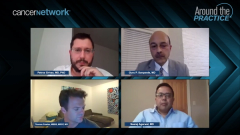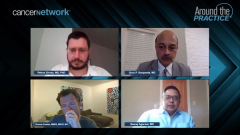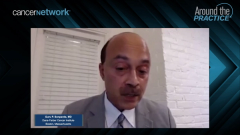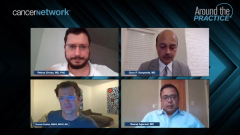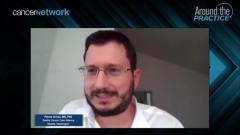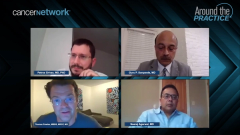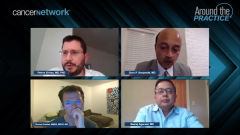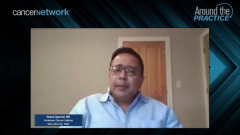
Diagnosis of Advanced Urothelial Carcinoma
Bladder cancer experts discuss the importance of detecting early signs and symptoms leading to the diagnosis of advanced urothelial cancer.
Episodes in this series

Petros Grivas, MD, PhD: The next question is for Dr Sonpavde. Because we discussed this topic, any challenges in terms of the diagnosis of patients with urothelial cancer in general and also specifically in the metastatic disease or even early stage disease?
Guru P. Sonpavde, MD: It’s key to pick up the symptoms early and to suspect bladder cancer. As you know, the symptoms of bladder cancer can be quite nonspecific in the beginning. Urinary tract infections are of course a much more common cause of dysuria, urinary frequency. You can have kidney stones suspected sometimes. It’s important to remember that for somebody who has long-standing symptoms, we keep coming back to start suspecting bladder cancer. When you see hematuria, even microscopic hematuria, this cancer arises in the lining of the bladder and does tend to cause hematuria early on. That’s something to be vigilant about. Also, voiding symptoms are not always UTIs [urinary tract infections], so always be mindful of that. Especially in women, it tends to get misdiagnosed frequently as urinary tract infections.
Petros Grivas, MD, PhD: Thanks, Guru. This is a very important point. We have seen all advanced patients having a delayed diagnosis, especially younger patients and women, because of UTI, kidney stones, and so on. A very important point is for the primary care provider to refer these patients early on to urologists for proper work-up for hematuria and other urinary tract symptoms.
Neeraj, recently you led the publication of a paper looking at the patients who get treatment with advanced urothelial cancer. To our surprise, we show that only a small portion of patients make it across lines of therapy. Do you want to comment on that and give us a sense of this real-world snapshot from 2018?
Neeraj Agarwal, MD: Of course, this isn’t happening in bladder cancer only. We’re seeing this in prostate cancer. Are the clinical trials—phase 3, large registration trials, which are so-called practice-changing trials—really changing practice in the real world? That’s the million-dollar question in front of me. In the small study we were talking about, we just collected that data from multiple studies, which looked at the real-world use of systemic therapy in patients with advanced or metastatic bladder cancer. Of course…Dr [Umang] Swami was there—he’s a colleague of mine at Huntsman [Cancer Institute], so I should give credit to everyone here. To our surprise, we saw 48% of patients in the United States receiving first-line therapy. Of 100 patients being diagnosed with metastatic urothelial carcinoma, bladder cancer, less than half are receiving first-line therapy. Going to the second line, we’re talking around 20% of patients—18% to be precise—receiving second-line therapy and only 6% of patients receiving third-line therapy. Of course, these data were based on the studies done until 2018, so we didn’t have enfortumab vedotin or sacituzumab govitecan, which just got approved. But PD-1 and PD-L1 inhibitors were already approved in the United States. These data are kind of alarming to me.
Petros Grivas, MD, PhD: Absolutely, and it highlights that in the real-world setting, fewer patients than we think may get practice compared with the selective filter of academic practice. Hopefully with the advent of new therapies, more recently with checkpoint inhibitors, as well as drug-drug conjugates and erdafitinib in the subsequent line of therapies, we may increase and retain more patients on treatment as well as on maintenance therapy, which we’ll talk about in a second.
Transcript edited for clarity.
Newsletter
Stay up to date on recent advances in the multidisciplinary approach to cancer.


